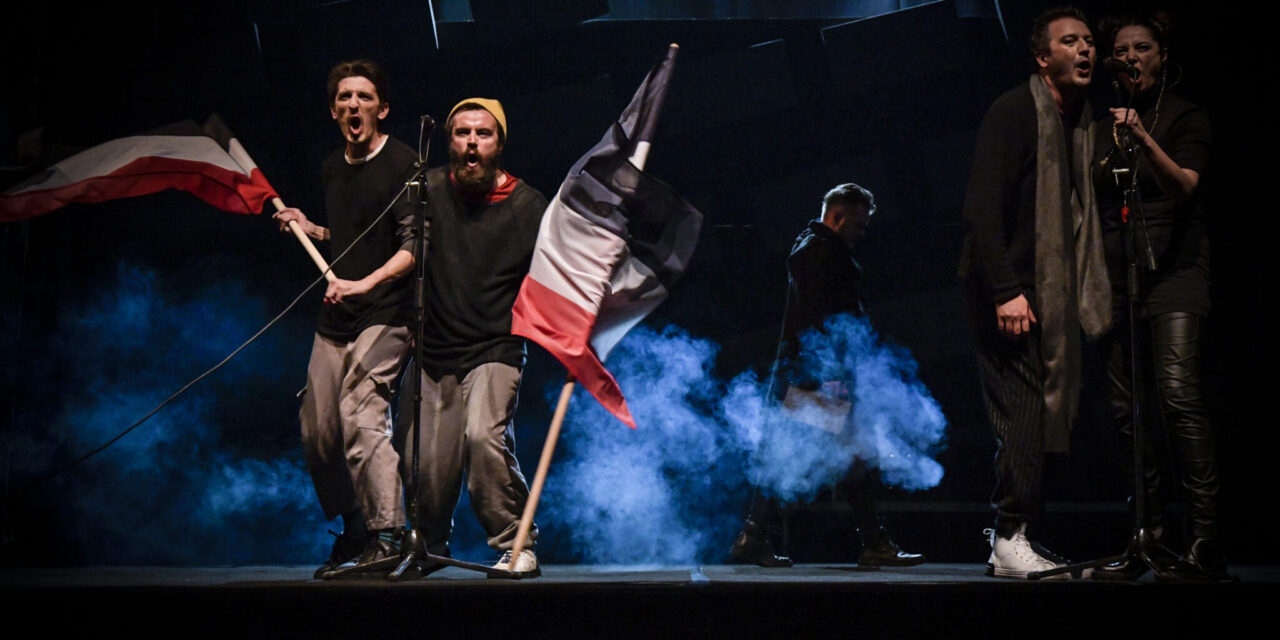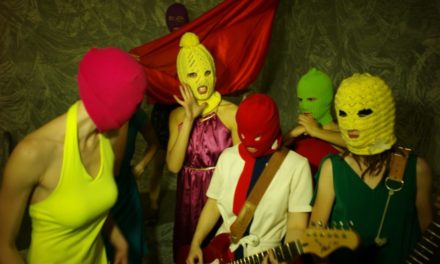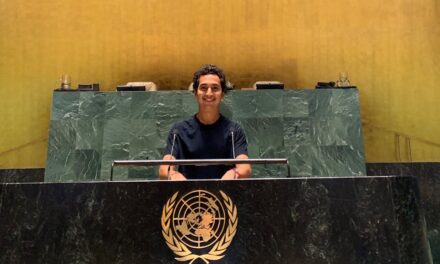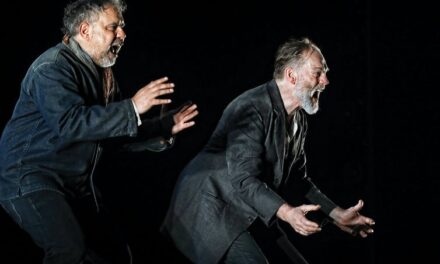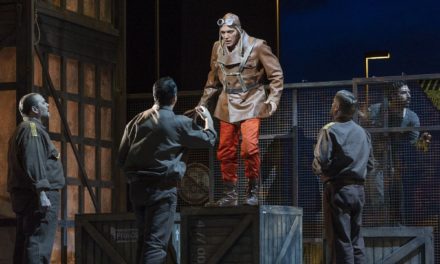Deniz Başar and Handan Salta attended Kosovo Theatre Showcase and apart from seeing the plays and witnessing the theatre scene they interviewed the guests of the showcase.
The fourth of the showcase in 2021 saw many co-productions from different countries which all came together in the little city of Prishtine to tell the world about the aftermath of the Balkan War, traumas, steps taken to come to terms with the wounds of war as well as the painful process of being an independent country with a heavy luggage and limited resources.
Marked by the Kosovar playwright Jeton Neziraj, this showcase is an important event in the cultural life of the country to celebrate art, theatre and diversity. International guests also articulated the need for more dialogue, expression and cooperation.
One of the international theatre critics who joined the Showcase, Steven Leigh Morris, wrote an article about the pieces we watched during our time in Prishtine.
In this survey, Deniz Başar and Handan Salta focus on the reflection of participants who took part as audience members and workers of the international culture industry.
Salome Seitz
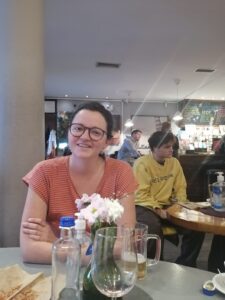
Salome Seitz
Salome: My name is Salome, I am from Switzerland, Winterthur. Currently a volunteer at the Theater am Gleis. It is a small theatre close to Zurich.
Deniz: Through which contact did you come to the showcase?
Salome: Actually I was invited, and grabbed the opportunity. I had just started working at the theatre, so I was the only one having time.
Deniz: I am assuming that you had been working in different plays, as a volunteer?
Salome: No, I am in programming. We are a group of seven people and many of them, of the senior ones left in the past year. They want to start some new stuff, some festival.
Deniz: So among the plays that you have programmed, which one would you like to take to Kosovo?
Salome: Nothing yet. I am just seeing shows now and haven’t decided on anything yet.
Deniz: But among the stuff that you have seen at home which one of the works would you like to see on Kosovo stages, and why?
Salome: At least I have seen one, it is called Oma Paloma. It is about women getting older. And what is interesting to them, what they want to talk about, and how they are seen by the public. And the director used quotes from famous politicians; she took quotes from famous people, women, but also from people on the street, she was just interviewing people in Winterthur and put it all together. And she cut it together; in really a great way. Concerning the topic of women [here in Kosovo Theatre Showcase], which I find handled in a difficult way for me here. We have seen many women on stage and they were presented as cliché roles.
Deniz: Which of the pieces that you have seen in Kosovo Showcase did you like most?
Salome: I have the most controversial feelings about A.Y.L.A.N. To me it was very – it sticks to my mind. It was very difficult to see Aylan Kurdi, the small boy on the boat. To me it had voyeuristic aspects. So actually, I was thinking about leaving the piece, but I am still thinking about it. It still sticks to my mind. It is a good sign, obviously.
Julia Wissert
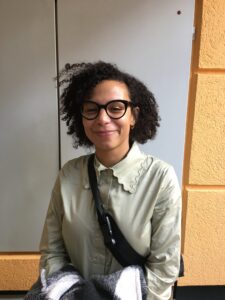
Julia Wissert
Julia: I am Julia and I am the artistic Director of Schauspiel Dortmund. I came from Dortmund straight to Pristina.
Handan: What brought you here? Through which contact did you come to the showcase?
Julia: I got an email by this person called Jeton (they laugh) Asking me if I want to be on the panel! And first I thought that I had no idea why this person was calling me and I didn’t understand why I was getting an email from Kosovo so we started to write each other.
Deniz: So he found you?
Julia: Yes he found me, for some reason. Then we had a really cool conversation then I agreed to come here, because it was really amazing to talk about theatre.
Deniz: I know you haven’t seen many plays yet but which performance did you like best?
Julia: I’m always hesitant to say which one I like the most but I have to say that I am very much drawn to formal aesthetics. So the first one that really struck me was the interpretation of Hamlet; it was a very strict formal setting and I would have loved to speak with the director about how they came up with the idea and what their focus was. It is an interesting setting to tell a collective and communal story and I didn’t need subtitles. The other one was Balkan Bordello because I was also interested in the combination of the overwriting of the adaptation of the classical text and the usage of physical work in the setting of a classical tragedy like Electra. The connection between a space like Kosovo, using the mythology everyone knows and also creating an aesthetic that is very formalized and plays on the communal knowledge of a country.
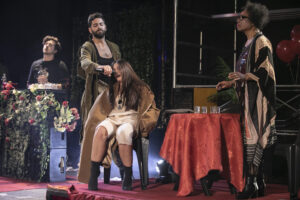
“Balkan Bordello.” Photo by Ferdi Limani.
Handan: How about your works, which one of the productions you were involved you would like to bring here?
Julia: I am never satisfied with anything I create because you always see what didn’t work. But I’d suggest a work I did in Czech Republic, in Brno National Theatre, The Odyssey in 2018 it was interesting to be working in a context where you don’t speak the language and you choose Greek mythology which is language-based and it became a very physical, very formal interpretation. As for my recent works I’d probably bring a piece I did for Dortmund, a play by Annia Ernaux (Der Platz) about working-class, structural discrimination of people because of their class background.
Deniz: What do you think of gatherings like this showcase? What benefits could theatre people get do you think?
Julia: I think they are extremely important because you exchange impulses of different aesthetics and ways of storytelling in a society where people have different backgrounds. I think it’s important to be open for different ways of storytelling and they need to be told. So, exchanges like these are extremely important to meet artists, collaborators, scientists, theatre researchers.
Steven Leigh Morris
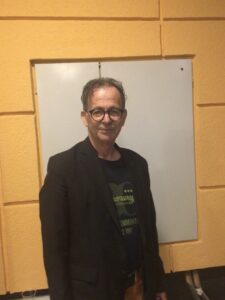
Steven Leigh Morris
Steven: I teach at a university that keeps heart and soul together. I am a playwright. Now the field of journalism, which I was a part of for decades, has pretty much imploded that gives me freedom to write plays. But I also have a journalistic website and hired many of the critics that got downsized by the current state of journalism in California, planned on so they cover theatre. So it is a three-pronged life.
Handan: How did you hear of this, how did you come here?
Steven: Jeton visited California. He had Department of Dreams produced by a theatre in Santa Monica called “City Garage”. And I met him there. Theatre asked me to host a panel in which he was present. So, we got to know each other, I really liked the work and I liked him and I guess the feeling was mutual so he invited me to the showcase.
Handan: So, is it also your first time here?
Steven: It is my first time in Kosovo. Yes.
Handan: And among the plays we have watched which one really touched your heart?
Steven: Probably the one we saw this afternoon, A.Y.L.A.N. .
Handan: And can we say that it is the one that you liked the best?
Steven: You know, it is also between that and Balkan Bordello. I think that’s the one I like the best because it touched the heart. Balkan Bordello came close, but the other one was funny and touched the mind. And it [A.Y.L.A.N.] was provocative, because it touched the fibres, went to the bones.
Handan: Yeah, I remember the silence of everybody.
Steven: People couldn’t applaud on it.
Handan: And among your plays or among performances you contributed, which one would you like to bring here?
Steven: I have to think about, when I see – I have to reflect on what is helpful for this area, Kosovo. Because, a play that may resonate in Los Angeles may be an extremely foreign entity on the other side of the world, so my plays are text-based and if they are performed in a language that is not native here, I think that might make a big difference on how they’re received; so they have to be supplemented by physical staging that we don’t need [in LA]. So long way of saying, I don’t know yet.
Handan: And the last question is about this showcase and what are the benefits of this showcase? And how did you benefit?
Steven: First I got to learn about a part of the world. I thought I knew, because I had a newspaper knowledge, and a documentary knowledge, but now I have theatre knowledge. Mainly through Jeton’s plays. Also, it looks like, it brings job opportunities to write for other parts of the world.
Jasmin Maghames
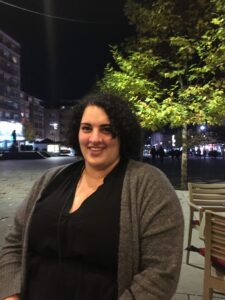
Jasmin Maghames
Jasmin: My name is Jasmin Maghames. I am a dramaturg from Germany, I am 31 years old and it is my first time in Pristine.
Deniz: What brought you here?
Jasmin: Actually someone from my theatre was invited, from children’s theatre department, but she couldn’t make it this time and they said ‘One of us should go’ they asked me, and I was really happy and excepted the offer.
Handan: As for the plays at the showcase which one did you like best and why?
Jasmin: I think I liked Hamlet best. First reason was the aesthetics and the room because the space was telling me a lot since there was no translation. I don’t know much about history of Kosovo so when I read the subtitles I get distracted from the play and the actors. But when I was watching them [the actors] there was no translation and I know the story of Hamlet so I just could get immersed into it and follow the story.
Handan: If you were to offer a performance or a play to be performed at this showcase which one would you like to bring here?
Jasmin: I think I would like to bring a production about immigrants in Germany. Although I do not agree completely with many decisions made by German politicians related to visa, the situation in Germany is not so bright either. Since there is systematic racism in Germany, people are facing so many problems and it must be shown that it is only more balanced than ‘we’ as Kosovars and ‘you’ as Germans [as represented in many plays in the Showcase]. In this power game Germans are more privileged, so I would like to bring something political from this stance I guess.
Handan: What benefits do you find in this kind of festivals or showcases?
Jasmin: I learn what other professionals -scholars, curators- are working on in the industry. When I was talking to those people here, I saw the diversity of the theatre productions. Also, it was really helpful to see that everybody was having difficulty to get funding from governments and having stereotypes working in this industry. So I really like this connection and talking about it, seeing and helping each other in a kind of way, in this free atmosphere in a sincere way.
Deniz: Is there anything you would like to add?
Jasmin: We are all here from different professions but within the same sector and we came here for the love we have for theatre. Also to get on the level with these people in a free atmosphere is very nice. I would actually like to have these kind of talks in structured rooms when everybody is present; not just in small groups happened to form during lunch breaks by coincidence. Maybe just talking with the people from here about what they are showing us, what they are doing here or what questions do you have for us, to acknowledge us as a group with different backgrounds would also help building bridges.
Natasha Tripney
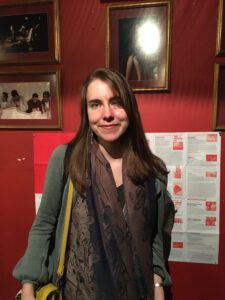
Natasha Tripney
Natasha: My name is Natasha Tripney, I am from London, in the UK. I am a journalist and a theatre critic. I work for The Stage, which is a UK publication about the theatre industry. But I am also a freelance writer so I write for a number of publications, including The Guardian.
Deniz: What brought you here? Through which contact did you hear about this?
Natasha: Well, I have been here before, so I came to the first theatre showcase in 2019. Jeton Neziraj contacted me, because of my journalistic background and my interest in theatre in this region; and invited me and I had such a positive experience that I come to every showcase since.
Deniz: Among the theatre pieces that you have watched recently; which one do you think should come here for the next showcase?
Natasha: There is a UK company called, In Bed with My Brother, they make very anarchic performances that I think could fit in very well with the tone and tenor of this festival. There is also a company called Sh!t Theatre they also make political theatre that is very engaged, but also really have a sense of humour to it. And I think the ethos and anarchy of both of these companies fit very well in the Kosovo context.
Deniz: Among all of the things you have watched [here], which one was your favorite and why?
Natasha: I really liked Balkan Bordello, because of the scope of it, the ambition, the cross-cultural collaboration and for the text itself, which I found really powerful. I am also a real fan of The Return of Karl May, the collaboration with the Volksbühne theatre; because of its visual language, as well as its wit, its sense of humour and provocation. I like this last piece [too], this double life [The Swiss Connection], the way he used multiple languages, to explore the question of identity and place in the world.
Deniz: And how do you think these kinds of showcases and festivals help theatre communities across borders?
Natasha: I think they are incredibly valuable, in terms of bringing people together from different countries and from the region, more generally in Europe and the world. It is a real chance to see the work in the context which it was made. So I think this is very valuable and important. And there are really strong opportunities for sharing stories, experiences and art.
Deniz: Thank you. Is there anything that you would like to add?
Natasha: Just, I think that this is like an incredibly valuable endeavour for Kosovo; but for theatre, it is sort of – lessons could be learned from how this is curated, how its hospitality works, how it invites people and engages with artists, critics and audiences.
Dagmara Gumkovska
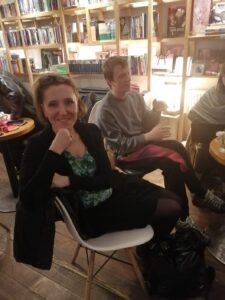
Dagmara Gumkowska
Dagmara: My name is Dagmara Gumkovska and I am a curator and an art manager and a member on the artistic board of Kontrapunkt Festival which is celebrating its 55th anniversary this year. I am responsible for foreign productions. I also work for SllesiaTheatre, I am also the program curator of the Open the Door international theatre festival in Katowicach.
Handan: What brought you here in Kosovo?
Dagmara: I received the invitation as Kontrapunkt Festival representative and I thought it is interesting for both projects that I am involved. I knew very little about Kosovo theatre, but by attending projects and showcases like this you do not only learn about the productions but you also know who to ask about. Thus, it is always beyond the surface. That’s why when I saw the invitation, I thought it was a great opportunity to see what the theatre and art looked like here.
Handan: Among the plays which one did you like most or which one touched your heart most?
Dagmara: I actually liked several of them a lot. When it comes to the heart it was A.Y.L.A.N since it is done with compassion, understanding and with the fury against the situation. I liked the using of theatre space cleverly and how the actors moved around it. Although it was not a big production, still they achieved the result of really big performance in a big scale. I also like The Return of Karl May. So it was a very clever example of cooperation with Volksbühne and the company from Kosovo. Also Balkan Bordello, the text was very rich in many levels, it managed to connect things with recent political events and tragedies with Greek masterpiece and mythology.
Handan: If you were to suggest or asked what play would you bring here to Kosovo?
Dagmara: I do not know because they usually go for smaller productions. But I guess I would suggest some performances that are touching the issues of Sllesia might be relevant in a sense of historical identity.
Handan: Apart from the nature of the showcases we know of, what other benefit do you see in these meetings?
Dagmara: Apart from seeing the performances themselves in the context but you also see a bit of society they are rooted in. Meeting people from other places and building human relationships is equally important.
Petr Pola
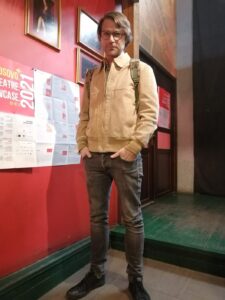
Petr Pola
Handan: Who are you, why are you here?
Petr: It is a hard question. In these days I am the artistic director of the Malá inventura festival. It is a festival of new theatre in Prague. Today we will have the 20th edition of this festival.
Handan: How did you hear about this showcase? Is it your first time here?
Petr: Yes, it is my first time here, in this region. I met Maud [Dinand] two years ago in our festival. So, this is the reason why I am here. And I wanted to see theatre in Balkans.
Handan: So, among the plays you have watched, which one did you like most? Which one touched your heart most?
Petr: Yeah, definitely the Karl May. It was best for me.
Handan: And why?
Petr: Because it was very subtle-istic, ironical, lively, there was a lot of insultation of Central Europe. It was very fast and energic. A lot of self-irony.
Handan: Are you in the production side of theatre? Are you writing or directing?
Petr: I am also – let’s say – dramaturgist for a small theatre, devising theatre, which focus on objects and puppet theatre and so on… And we are doing this maybe for fifteen years.
Handan: Among those productions that you work in, or participated in, created; which of them would you like to bring here?
Petr: I don’t know. Maybe Kosovo is still fighting with the heavy memories. So maybe I would like to see more physical theatre here. Because, obviously we can see a lot of Jeton’s productions so, I don’t know [it would be good to see] other aspects of Kosovo theatre.
Handan: Apart from seeing so many plays by Kosovar playwrights, what do you think this showcase adds? [To people like us, by bringing us together?]
Petr: Definitely, for me it is a great opportunity to see theatre in this region, in Kosovo. The themes, the subjects, the heavy memories, the discussions were very great; because I didn’t know people from one state [in Balkans] can’t go to another state, and come host… So it is very informative for me, what is happening, and definitely the people here came from everywhere.
Dieter Topp
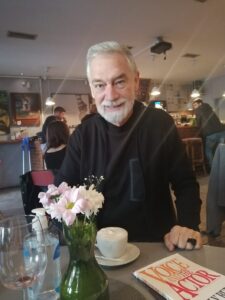
Dieter Topp
Dieter: My name is Dieter Topp, I’m from Cologne, Germany. I am wearing several hats, first of all the president of the European Culture Forum for 29 years and I am also a journalist and running a press agency in Germany.
Handan: How did you learn about this showcase and is it the first time you are here? How do you find it?
Dieter: I was supposed to be here last year but due to pandemic we had to postpone it, so it is my first time to have live contact with theatre from Kosovo and Albania. I came here because I intend to spread some cultural aspects from Kosovo especially to the west, to other European countries, especially to countries of German language. I write about several festivals in Europe mainly north and Eastern Europe, Romania Bulgaria etc. Kosovo is a small region but there are some theatrical bases to be promoted and especially the author Jeton Neziraj whose plays have been brought to stage not only in Kosovo but during this festival we have seen some other plays written by him performed by outside countries. The problems of freedom especially after the war are still evident on the stage and it reminds me of the so-called revolution in Romania in 1989 and that is a decade older than the fight for freedom in Kosovo and it is still evident in this country. So no wonder that most of the plays we have seen are dealing with immigration problems, economic problems etc. It is important to transport positive images from this country to other countries to show that there is more than imagined average people from Kosovo. The best thing to do that is to do via a bridge of culture.
Handan: Which of the plays you have seen you liked most or which ones touched your heart most?
Dieter: The one that impressed me a lot was Balkan Bordello and let me tell you why. Balkan Bordello is a kind of cafe that Jeton Neziray established by his play. There are other famous cafes in the literature and in the world of major films, for example there is a film called Baghdad Café (Out of Rosenheim) and the novel by Dea Loher, Praca Roosevelt taking place in San Paulo, which plays with all these junkies, intellectuals, transvestites where they all meet in a huge café. I was wondering how this play would be directed and apparently she [Blerta Neziray] did a wonderful work. She really managed to establish the atmosphere down the road to Serbia during the period at the end of the war and saw all these different figures living and acting and interacting based on the Greek philosophical and ancient play.
Handan: If you were asked to which performance would you bring here from Germany?
Dieter: At the moment I don’t have any idea, but there is one idea I supported because I brought the European cultural award to Jeton. He is the one willing and able to breakdown the cultural, political social barriers by his writings and is a very good ambassador from Kosovo to Europe and the other parts of the world. He has been awarded for the 29th European awards for cultural achievement.
Verity Healey
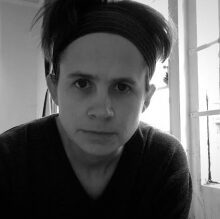
Verity Healey
Verity: My name is Verity and I am a theatre critic from UK. I write for newspapers and magazines like The Stage, The Guardian etc.
Handan: What brings you here? You told me that you were here last year as well. So what brings you here two years in a row?
Verity: Yes, it is my second time here. There were less people and it was less international. I heard about it through Natasha [Tripney] who is a friend and colleague, who writes at Stage in the UK. She suggested me to Jeton because I have an interest in Slavic and Balkan world and Eastern European theatre. I am new to theatre criticism, it’s been about 6 years and I’ve never studied theater. I studied film instead, but they are related.
Handan: Among the plays we have seen, which one touched your heart most? Which one is your favourite?
Verity: I have to give two answers actually. The one that touched my heart the most is A.Y.L.A.N. The production says just simply something about humanity, the thing just needs to be said; it’s a very metaphorical show but when it gets to the step when it’s needs to be said about how human beings are cruel to each other, it’s just there. I think there were several shows that moved me but that the one with the most was Aylan’s image at the end. I thought it was terribly moving and I can’t say that I liked the show because of what it is about, because it’s about death and how they treat people, refugees and all about, so I can’t say that I liked it, but what I really liked is Balkan Bordello. Aside from what it was about, it was fun, crazy and it is very democratic in the way it allowed you to look around the stage and find what you’re interested in to look at.
Handan: If you were asked which production from UK would you bring here?
Verity: Did you mean as a representation of British theatre?
Handan: No, among the plays you have seen, which ones would fit here?
Verity: Probably a work by Alex Istudor – he is Romanian but living and working in the UK theatre industry in London. I would like to bring his production of The Other Country based on the writings of Romanian/German author Herta Müller, which he directed for Romania’s Craiova National Theatre as part of the prize for winning The National Contest for Young Directors in 2016. And then I will definitely think about bringing work from Belarus theatre who makes work in the UK in the US and in Belarus and the aesthetics definitely fits here, also it’s a very physical kind of theater.
Handan: What benefits do you see in these kinds of gatherings
Verity: These kinds of events give people the cause from other countries to reflect upon their own -practice but also to look differently at different practices that are going on in their own country and the issues in their own country. I’m very happy to be here that because it’s very hard to talk to directors and actors back in the UK about what they expect from critics and criticism. It is a bit ‘them’ and ‘us’ situation between press people and theater people and there’s a little bit of control from press departments about what to see, what can be viewed and how is everything connected with marketing and branding in UK which I really dislike. So it’s enabled me to think about criticism in UK, the depth and how theaters use it.
Paul Piik
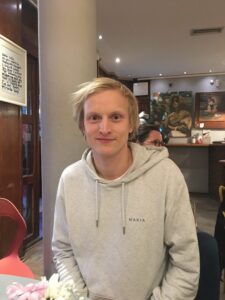
Paul Piik
Paul: I am Paul Piik, from Estonia. I work as a theatre producer in a company called Kinoteater and I also work as a freelance dramaturg and a joke writer.
Deniz: What brought you here and through which contact did you learn about this?
Paul: I have been visiting theatre festivals since 2012. First it was more for work for me, but then it became a way to travel and – how do you say? – mix a hobby with holiday. And I got the information from Lizzy, who was working for the Estonian theatre agency.
Deniz: And among the plays that you have seen here which one did you like best and why?
Paul: I think what I liked the best was Karl May. I guess it was just – what do you say? – witty, it had some nice turns, nice directing tools. At the same time it sort of pressed on the right buttons with the society and politics. How do you say – it is like, you make a point through actually making people laugh at first and you talk about the serious things, and then I think it is a nice way to approach certain contexts.
Deniz: Amongst your own works which one would you like to take to Kosovo? And why?
Paul: Hmm, that is an interesting question. I guess something that either theatre written by themselves, original material; I think one show by my brother Paavo [Piik] which is called Gesamtkunstwerk which is like very – it is actually funny or energetic way of showing how art affects people. Like how music, theatre affects people… It is very very fun and very I think, like a good way to – how do you say? – you can always write an essay, or academic things, but you can also sometimes give lessons through theatre. I think that is a very nice way to teach people about art.
Deniz: And how do you think these showcases and festivals help theatre people?
Paul: These settings that we are having and the information that we share, that is something like always the most valuable thing. Especially in a time like, we spoke with Steven [Leigh Morris] about it, when experts are not listened anymore. It is very hard to select the right information. And I think who represents this very well is actually the star of the festival, Jeton. I mean, he was actually building this special meeting, this getting together…
Deniz: I have one extra question for you. Based on the market place [presentation that you did for Kinoteater]. So, how do you contextualize your own work in the context of Estonia? Like what do you think you are provoking with your work?
Paul: I think we have… Because we have work for ten years, we have done – tried to always not repeat ourselves. But I think after this ten years we are actually going back to the very beginning, that we should do things that repertory theatres wouldn’t accept. If we have something that repertory theatre accepts then we go and do it there. If we have something that no one would really accept, it is either too artistic or too radical, then we do it in our theatres.
Deniz: Is there anything that you would like to add?
Paul: Just looking forward to the invitation to the Istanbul Theatre Showcase.
Deniz: Soon. Well, thank you!
Klara Drnovsek
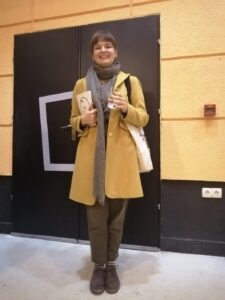
Klara Drnovsek Solina
Klara: So, I am Klara Drnovsek Solina, I work for an NGO called Bunker and it is a theatre performance production company in Ljubljana. In Bunker we also run a venue called Stara mestna elektrarna (translated as Old Power Station) which was, in fact, the first power plant for electricity in Ljubliana. I’m here as a co-programmer of the Mladi levi festival (translated as Young Lions). In 2022, the festival will celebrate its 25th year.
Handan: How did you hear of this showcase and how did you decide to come here?
Klara: Through Quendra Multimedia invitation. I come here as a programmer of the festival but I’m also open to finding new connections and organizations to collaborate with.
Handan: How about the pieces you have seen here? Which one did you like most, or touched your heart most?
Klara: I would say it was A.Y.L.A.N. I liked how it addressed the subject of refuge seekers in the European Union and how EU and west is responding to the refugee crisis. It exposed very obviously, very explicitly how refugees are seen as a source of generating profit and that there is nothing humanitarian in there at the end.
Handan: Among the productions you participated, which ones would you like to bring here or which ones would fit best here?
Klara: Maybe a young theatre artist, Lea Kukovičič, that we work with at Bunker who just established a theatre performance auction house. In August we had the first theatre performance auction. I think it is a new phenomenon in the scene on the whole, not just in Balkans scene. I know there are established performance auction houses for ephemeral arts or ephemeral theatre pieces before; I think it would be interesting to bring these here, it will be interesting to see the way she sells the performance, it’s like she takes the performance she makes lots out of it. This could be interesting to see it here because it is nice to observe art markets and how they respond to it. So as we’ve just seen in the A.Y.L.A.N., there is interest for profit everywhere; in humanitarian crisis or in theater. The Performance Auction House bites in the theater bit.
Handan: In these kind of showcases we can see the concerns of a country through theatre, but what else do they contribute to?
Klara: I would say broadening horizons. Not just meeting new people and seeing different cultures. When you are seeing so many performances from a specific place you can really see what’s the red line of it, you can see which topics are interesting for that specific society, what the problems are. Of course you see obviously the theatre trends and but also you can see the society through the performances, topics they are interested in, their problems. I think this is very obvious here in Kosovo Theatre Showcase because there are so many of us coming from European Union and this one topic, the relationship between the Balkans or the European Union is the recurring one. It leads everyone to reflect on “Where is Europe now?”. It is mirroring EU very well.
Nastazja Domaradzka
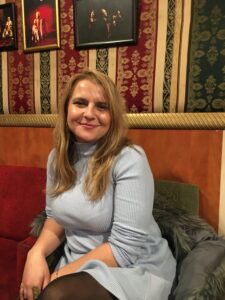
Nastazja Domaradzka
Nastazja: I came from London although I am originally from Poland, and I am a theatre director and theatre maker.
Deniz: What kind of shows do you do?
Nastazja: I am a feminist theatre director so most of my work is new writing work that put women in center stage.
Deniz: What brought you here? How did you hear about the showcase?
Nastazja: Jeton brought me here. Jeton heard about me from Natasha Tripney who is one of the editors in The Stage in Britain. And Natasha knows that I make quite experimental, politically driven work. She thought I would be a good person to invite.
Deniz: Which one of the plays did you like most in the showcase and why?
Nastazja: I think Balkan Bordello is the one I absolutely loved, because of the aesthetics of it, I think it was a brilliant visual show, performances were incredible, and the reason I loved it so much is because it does that thing that people in the Balkans – for the lack of the word – the people from the Eastern Block, theatre people are very good at tackling very serious issues, in many cases traumatic issues, but doing it with humor. So, in a way we are not afraid of taking a piss out of ourselves. It is absurdist, political narrative that I am really intrigued in, and it was full of that in Balkan Bordello.
Deniz: Which among your own works would you like to bring to Kosovo?
Nastazja: Oh god, that’s an interesting one. I think my production that I directed at the Almira Theatre back in May [2021] The Forefathers Eve, which is a feminist adaptation of a Polish classic. And I would like to see how it goes down in Kosovo.
Deniz: How do you think it would be perceived [in Kosovo]?
Nastazja: I don’t know, to be honest with you. It would be something different perhaps. And not necessarily in terms of aesthetics, or the experimental side of it; but more like you know, the subject matters that it touches on, I think it would be well received here, yes.
Deniz: What do you think these kinds of showcases or festivals do for the arts community, theatre community?
Nastazja: I think you cannot put a value on it. I think it is just so incredible to come together for people from all over the world quite literally, to have important conversations. I have met so many incredible people here, which I will stay in touch with, no doubts, over the years. And I just feel very very inspired.
Deniz: Is there anything that you would like to add?
Nastazja: I would like Balkan theatre to be more seen in the West. I think that is something that I would like to see. I think the work here is full of resilience, freshness, brilliance; and it would be interesting to see it performed in Britain for example.
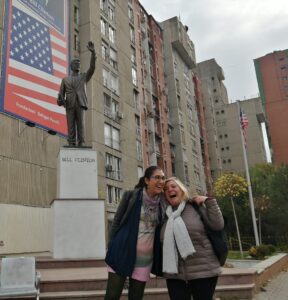
Deniz Basar and Handan Salta
Handan Salta (PhD) studied English Literature and Dramaturgy. She worked as a lecturer and an academic; gave courses on Theatre History, Turkish Theatre, dramaturgy, text analysis, creative drama, mythology and retired in 2015. She worked as the Vice President of Turkish Theatre Critics Association. Currently she is working as a theatre critic and translator. As well as several different texts, she translated many plays from English to Turkish and vice versa. She has also been in the editorial board of OYUN, a quarterly theatre magazine since 2015.
Deniz Başar is a theatre researcher, puppet maker and two-time national award-winning playwright. Parts of her research are included in anthologies like Women and Puppetry: Critical and Historical Investigations by Routledge (2019), Palgrave Handbook of Theatre and Race (2021), and in forthcoming publications such as Creative Activism: Research, Pedagogy and Practice by Cambridge Scholars Publishing (2022), and Palgrave Handbook on Theatre Censorship(2023). She recently finished her PhD in Concordia University’s Humanities Department with her work on contemporary Turkish theatre. Currently she is an FRQSC post-doctoral fellow, and continuing her research projects in Istanbul.
This post was written by the author in their personal capacity.The opinions expressed in this article are the author’s own and do not reflect the view of The Theatre Times, their staff or collaborators.
This post was written by Deniz Başar and Handan Salta.
The views expressed here belong to the author and do not necessarily reflect our views and opinions.

